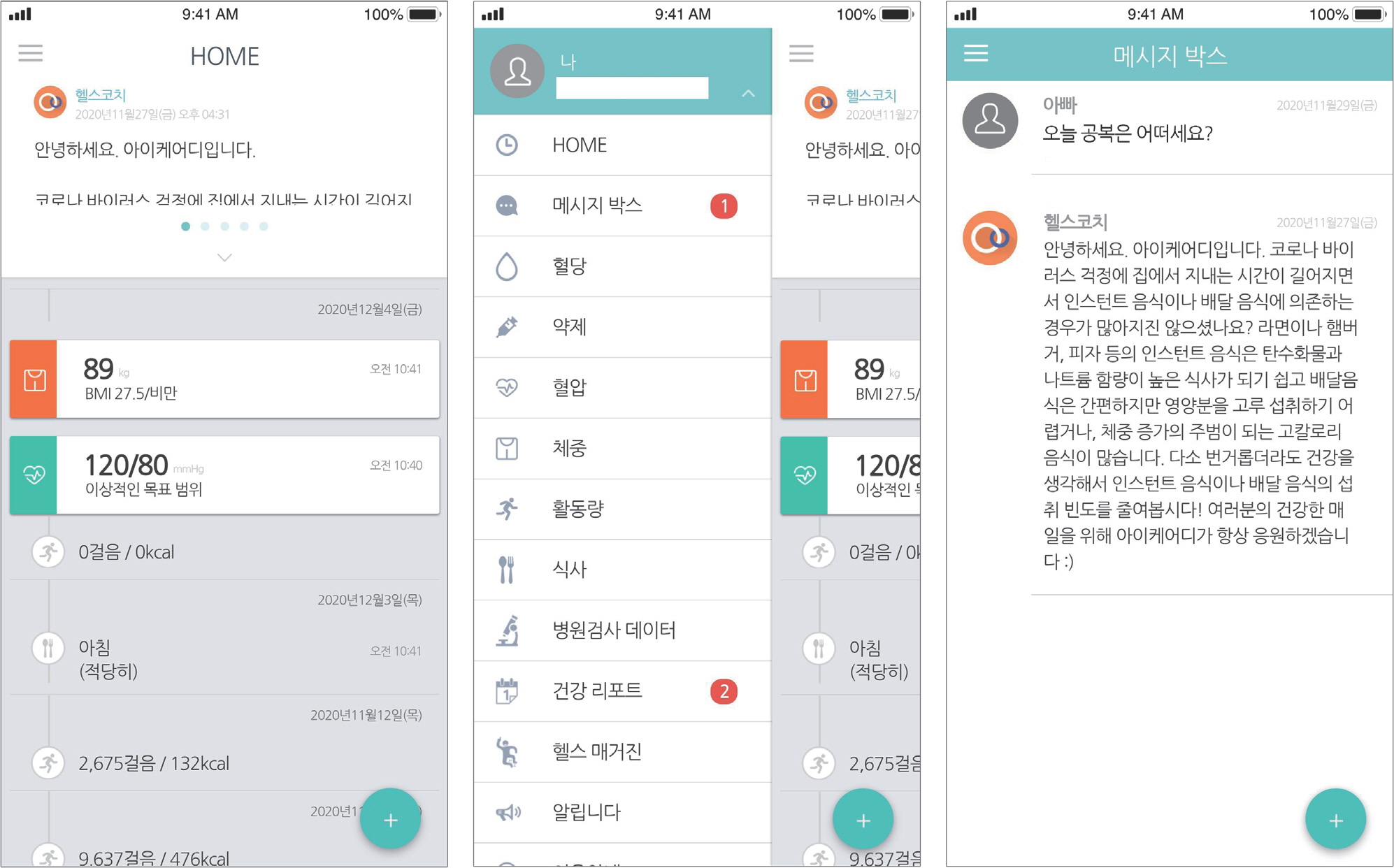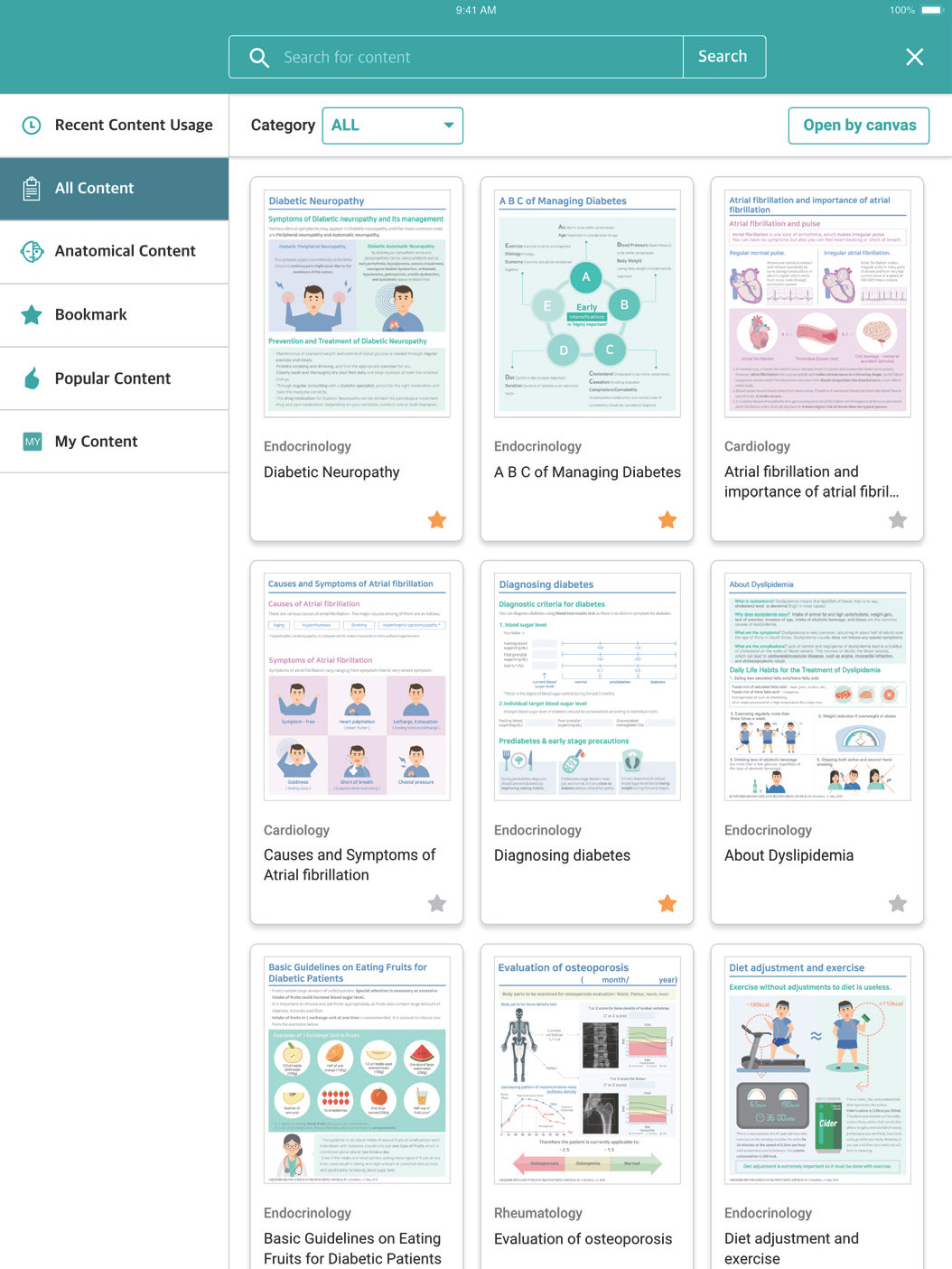J Korean Diabetes.
2020 Dec;21(4):204-210. 10.4093/jkd.2020.21.4.204.
Clinical Effects of Remote Glucose Monitoring and Patient-Centered Education Platform for Patients with Diabetes
- Affiliations
-
- 1Division of Endocrinology and Metabolism, Department of Internal Medicine, Seoul St. Mary's Hospital, College of Medicine, The Catholic University of Korea, Seoul, Korea
- KMID: 2511887
- DOI: http://doi.org/10.4093/jkd.2020.21.4.204
Abstract
- With development of the internet and smartphones, various systems have been introduced to monitor patient blood sugar remotely, and their clinical effect on diabetes management has been analyzed in different patient groups. However, these systems need to be available cost-effectively to many patients for the long term. Also, there is need for a communication platform that can easily identify a patient's blood sugar pattern and provide appropriate counseling and education. In addition, relevant educational contents must be provided so that patients maintain self-care for diabetes. With the rapid increase in diabetes patients, we must continuously develop the field of digital healthcare to efficiently monitor blood sugar and provide effective face-to-face management of these patients.
Figure
Reference
-
1. Wildevuur SE., Simonse LW. Information and communication technology-enabled person-centered care for the “big five” chronic conditions: scoping review. J Med Internet Res. 2015. 17:e77.
Article2. Kwon HS., Cho JH., Kim HS., Song BR., Ko SH., Lee JM, et al. Establishment of blood glucose monitoring system using the internet. Diabetes Care. 2004. 27:478–83.
Article3. Kwon HS., Cho JH., Kim HS., Lee JH., Song BR., Oh JA, et al. Development of web-based diabetic patient management system using short message service (SMS). Diabetes Res Clin Pract. 2004. 66(Suppl 1):S133–7.
Article4. Cho JH., Kim HS., Han JH., Lee JH., Oh JA., Choi YH, et al. Ubiquitous diabetes management system via interactive communication based on information technologies: clinical effects and perspectives. Korean Diabetes J. 2010. 34:267–73.
Article5. Cho JH., Chang SA., Kwon HS., Choi YH., Ko SH., Moon SD, et al. Long-term effect of the Internet-based glucose monitoring system on HbA1c reduction and glucose stability: a 30-month follow-up study for diabetes management with a ubiquitous medical care system. Diabetes Care. 2006. 29:2625–31.
Article6. Pal K., Eastwood SV., Michie S., Farmer A., Barnard ML., Peacock R, et al. Computer-based interventions to improve self-management in adults with type 2 diabetes: a systematic review and meta-analysis. Diabetes Care. 2014. 37:1759–66.
Article7. Hsu CC., Chang HY., Huang MC., Hwang SJ., Yang YC., Lee YS, et al. HbA1c variability is associated with microalbuminuria development in type 2 diabetes: a 7-year prospective cohort study. Diabetologia. 2012. 55:3163–72.
Article8. Hirakawa Y., Arima H., Zoungas S., Ninomiya T., Cooper M., Hamet P, et al. Impact of visit-to-visit glycemic variability on the risks of macrovascular and microvascular events and all-cause mortality in type 2 diabetes: the ADVANCE trial. Diabetes Care. 2014. 37:2359–65.
Article9. Yang HK., Kang B., Lee SH., Yoon KH., Hwang BH., Chang K, et al. Association between hemoglobin A1c variability and subclinical coronary atherosclerosis in subjects with type 2 diabetes. J Diabetes Complications. 2015. 29:776–82.
Article10. Istepanian RS., Zitouni K., Harry D., Moutosammy N., Sungoor A., Tang B, et al. Evaluation of a mobile phone telemonitoring system for glycaemic control in patients with diabetes. J Telemed Telecare. 2009. 15:125–8.11. Cho JH., Lee HC., Lim DJ., Kwon HS., Yoon KH. Mobile communication using a mobile phone with a glucometer for glucose control in Type 2 patients with diabetes: as effective as an Internet-based glucose monitoring system. J Telemed Telecare. 2009. 15:77–82.
Article12. Cho JH., Kwon HS., Kim HS., Oh JA., Yoon KH. Effects on diabetes management of a health-care provider mediated, remote coaching system via a PDA-type glucometer and the Internet. J Telemed Telecare. 2011. 17:365–70.
Article13. Cho JH., Choi YH., Kim HS., Lee JH., Yoon KH. Effectiveness and safety of a glucose data-filtering system with automatic response software to reduce the physician workload in managing type 2 diabetes. J Telemed Telecare. 2011. 17:257–62.
Article14. Garabedian LF., Ross-Degnan D., Wharam JF. Mobile phone and smartphone technologies for diabetes care and self-management. Curr Diab Rep. 2015. 15:109.
Article15. Yang Y., Lee EY., Kim HS., Lee SH., Yoon KH., Cho JH. Effect of a mobile phone-based glucose-monitoring and feedback system for type 2 diabetes management in multiple primary care clinic settings: cluster randomized controlled trial. JMIR Mhealth Uhealth. 2020. 8:e16266.
Article16. Cui M., Wu X., Mao J., Wang X., Nie M. T2DM self-management via smartphone applications: a systematic review and meta-analysis. PLoS One. 2016. 11:e0166718.
Article17. Wu Y., Yao X., Vespasiani G., Nicolucci A., Dong Y., Kwong J, et al. Mobile app-based interventions to support diabetes self-management: a systematic review of randomized controlled trials to identify functions associated with glycemic efficacy. JMIR Mhealth Uhealth. 2017. 5:e35.
Article18. Powers MA., Bardsley J., Cypress M., Duker P., Funnell MM., Fischl AH, et al. Diabetes self-management education and support in type 2 diabetes: a joint position statement of the American Diabetes Association, the American Association of Diabetes Educators, and the Academy of Nutrition and Dietetics. Clin Diabetes. 2016. 34:70–80.
Article
- Full Text Links
- Actions
-
Cited
- CITED
-
- Close
- Share
- Similar articles
-
- Patient Education in Type 2 Diabetes Mellitus through Continuous Glucose Monitoring Reports
- Application of Continuous Glucose Monitoring System (CGMS) and Patient Education
- Glucose Management Using Continuous Glucose Monitors
- Effective Diabetes Self-Management Education: Focus on Blood Glucose Pattern Management
- Use of Flash Glucose Monitoring in Patients on Intensive Insulin Treatment




